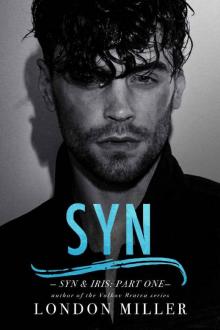- Home
- London Miller
Den of Mercenaries: Volume One (The Mercenaries Book 1) Page 12
Den of Mercenaries: Volume One (The Mercenaries Book 1) Read online
Page 12
The ’67 Chevy Impala was a masterpiece, and one of the few possessions to his name that he actually cherished.
Before leaving again, he popped the trunk, lifting the rolling case he had left behind during his last visit, and after he stowed it away, he skipped heading to a hotel, going to The Kingmaker first instead.
As expected, he was exactly where he said he would be, and at Niklaus’ approach, the man smiled though it didn’t ring true.
“Niklaus, always a pleasure.”
Control was one of the many things Niklaus had learned to appreciate after his had been taken away so easily. In his line of work, control was essential in making sure everything went according to plan.
And maybe it was because he lacked control around his new handler that he disliked the man so much. By nature, Niklaus wasn’t very trusting, but with his handler? Even less so. It didn’t help that he knew nothing about the man, and because of this, didn’t know what his motives were. And worse, his actions were too calculated.
Before, Z would call and set up a meet at one of his offices—one that was unlisted but always the same building—and they would be wrapped up within the hour.
When The Kingmaker—and that name was annoying as fuck to say—called, there was no guarantee where the meeting would be held. Their first had been in the back of an Escalade under the Brooklyn bridge, another in a sweatshop in the middle of Columbia—with Niklaus still not knowing how they had both ended up there in the first place—and now, they were standing in a trinkets shop in Chinatown, in a back room where years-old gambling machines were set up as men slouched over them in sweaty clothes, testing their luck.
The Kingmaker was seated at a leaning card table, currency from varying countries stacked in front of him as an older Asian woman stood next to him counting it all, tallying each bundle with a quick scribble of her pen.
“Do you have an update for me?”
“It seemed he didn’t mind talking business in front of strangers. The Russian knew nothing about the buyer, says he went through an Irish family—McCarthys—and through them we can find the buyer.”
“Interesting.” Tapping his thumb against his leg, The Kingmaker stared off to the side, not looking at anything as he was lost to his thoughts.
Niklaus was more than ready to leave, even if he had only been there for a few minutes—but he knew better than to leave before dismissed.
“The timeline has moved up,” The Kingmaker said breaking his silence. “I have reason to believe whatever deal was struck, it’s going to finish in sixteen days. I suggest you get a move on lest you lose your target.”
Usually, Niklaus spent months surveying his targets, learning their weaknesses, and their patterns of behavior. Going after an entire family, however, not to mention a mystery person whose name Niklaus didn’t even know … sixteen days was not enough time.
“That’s not going to work.”
The Kingmaker met his gaze, his expression telling him his thoughts on the matter, but Niklaus ground his teeth, choking down what he really wanted to say.
“If you want the job done—”
“If I recall, I gave you this assignment over a year ago. In that time, you’ve chosen to do everything but, including picking up a smoking habit.” His eyes skirted to the cigarette tucked behind Niklaus’ ear. “I’ve elected to ignore the latter, but you need to understand something, Niklaus Volkov.”
The room grew so silent that Niklaus’ defenses rose, waiting for a threat to appear.
His voice didn’t shift in pitch, nor had he changed his expression from the complete ease that was resting there, but in his next words, the threat was clear.
“The moment you no longer serve a purpose, you become useless to me.”
The threat rankled, and though it pained him to do so, Niklaus remained silent.
“I suggest you get moving,” he said as he glanced down at his watch, an expensive looking thing that cost more than Niklaus was willing to spend on anything except his car. “You’re running out of time.”
Back at his hotel room, Niklaus lugged the case from his trunk, carrying it into his temporary home before slamming the door shut and flipping all the locks. He didn’t have much time to prepare, so if he wanted to get a jump on this, he had to start now.
Turning the latches, he threw open the top of the case, pulling out a laptop bag, setting that on the table that was used for eating, then returned to the trunk to pull out a new vest—top of the line Kevlar—and a few of his favorite weapons. His rifle stayed locked in its case at the bottom. Though long-range shots were his specialty, he doubted he would have much use for it since his job was intelligence as opposed to assassination. As he finished checking over his gear, he went ahead and turned on the laptop, typing in the special encryption key that let him enter the network where he made a call to one of the two people he knew he would need for this assignment.
Usually, he worked alone—they all did. In their trade, it was easier to remain unattached. Not to mention that it could be deadly owing someone a favor. But he only had a little over two weeks to see this done.
An icon appeared on the screen, one depicting a smiling skull, then seconds later, a new window popped open, Winter’s face coming into focus.
“Red? I didn’t expect to hear from you so soon.”
“I’ve got a job for you.”
Gray eyes, almost as light as the shade of her bleached and dyed hair turned inquisitive as she studied him from her side of the screen. “Sounds fun. What do you need?”
That was a good question … “Everything. A family, last name McCarthy.”
She arched a brow. “That’s not enough for me to go on. It’s a common name.”
“Well as of now, that’s all I got. They’re a crime family undoubtedly with ties both here in New York and in Ireland. They traffic weapons, so that might help narrow the search.”
Winter nodded. “I’ll do what I can. What’s your timeline?”
“I need the information in forty-eight hours.”
Whistling, she shook her head. “My rate just went up ten percent.”
Despite him having to pay her exorbitant fees—at least until his check was cut for this assignment—Niklaus gave her a small smile. Even with the short time frame, one that most wouldn’t be able to manage, Winter always came through. “I’ll get back to you when I know more.”
The screen went black as Winter ended the call.
One down, one to go.
Digging out his phone, he pressed “two” then the call button, bringing it up to his ear, hearing the monotone ringing for several moments before blaring music sounded on the other end.
“What can I do you for?”
“I need a favor.”
“You seem to need a lot of those lately, boyo.”
Of course it would be Celt that gave him a hard time. “I’ll see you in twenty minutes.”
He hung up before Celt could respond, knowing that whatever his response would be would probably be something he didn’t want to hear.
Strapping up, Niklaus headed for the door. He had been in the room for all of twenty minutes before he was back out again. But he would have to get used to it again as he doubted he would be keeping regular hours over the next couple of weeks.
Celt had a series of safe houses all over the world. He could be the poster child for backup plans and making sure that if anything went wrong, he could hide out somewhere and not be found. In the state of New York alone, he had seven, but out of those seven, there was only one that he used as his private residence, and only seven members of the Den actually knew of its existence. Niklaus was one of those seven.
It was once a cotton candy factory, and despite the time that had passed since it closed down, it still smelled faintly of sugar. Celt had converted the place into a loft-style apartment, making improvements as he went along.
Pulling up outside the building, Niklaus killed the engine and climbed out, jogging over to the lift
, pushing the gate open and stepping in before pressing the button for him to go up. The lift rocked and rattled, a testament to how long the building had been standing, before it stopped entirely.
Stepping into the loft, Niklaus barely spared the place a glance—having been there a number of times over the years—and headed for the kitchen pantry where there was a hidden keypad behind the spice rack. One code and palm print later, Niklaus was stepping onto another elevator, this one having been specially installed by contractors that were close to the Den. The brushed nickel interior looked innocent at first glance, but there was a tiny camera in the ceiling, and if there ever happened to be someone riding down to the hidden level that Celt didn’t sanction, he only had to press a button on his phone to release a gas that would incapacitate his victim in moments.
On the ride down, Celt held life and death in his hands.
When the doors finally opened, letting in the stark whiteness of the War Room, Niklaus had to blink a few times to clear his vision. Guns lined the backlit walls, black racks hanging on all sides except for one. There were a number of monitors that made up that last wall. Three were for each level of the building where Celt had set up cameras, and the fourth was for the outside perimeter. Then, there was the wall of money that Celt had. While Niklaus was usually one to receive his payments in wired transactions to offshore bank accounts—before he ultimately moved the money when the need arose—Celt preferred to get paid in cash, storing the excessive amounts in his home. This wall of currency was only a small fraction of how much money was truly in this place.
Sitting at the conference table that was nearly as wide as it was long and split the room in half was Celt. His booted feet were kicked up, a keyboard resting on his thighs as he lazily surfed the web, barely sparing Niklaus a glance as he entered, but when he did, his answering smile illuminated his bearded face.
Niklaus could still remember the day he and Celt crossed paths.
It was after he had agreed to go with Z. After a plane and car ride that he only vaguely remembered. Perhaps a day’s time after Z had left him in that windowless room, his ominous words lingering in the silence of the room.
The longer he had remained in that room, the more time his mind had to focus, not on the mysterious place he had then resided at—though he’d had plenty of time to think on that considering how long he had been left alone. No, after his thoughts had drifted from the present, they went back to the one place he wished they hadn’t.
Sarah …
But the thought of her hadn’t overwhelmed him as he had thought it would. Instead, he had grown used to the silence, or he had falsely believed he hadn’t gone mad yet, at least until a piercing noise began emitting from the walls, forcing him to cringe away from the noise though there was nowhere to go.
Soon, he had thought he heard tiny voices talking to him, making him laugh at his own insanity.
He had been so sure he was losing it.
Finally, after he’d been sure he couldn’t take anymore, everything shut off once more as darkness reigned once more. A long time—or it had felt like that at the time—the door to his room had opened, making Niklaus jolt, his eyes swinging to the man that had been entering.
He hadn’t been much older than Niklaus had at the time, perhaps twenty-four or twenty-five—he still wasn’t sure of Celt’s age to this day—but he had the eyes of a man that had seen many things.
Unlike when Niklaus had first been brought in, Celt hadn’t been wearing a mask, and the only reason Niklaus recognized him was because of the two black bands that were tattooed on his left forearm.
He’d brought in a glass of water, a lifeline if Niklaus had ever seen one.
Right as he was about to leave, Celt had said something that had stuck with him since the last word was uttered.
“Do not fear death. Embrace it. Pain is inevitable, learn to love it.”
Niklaus didn’t want to think where he would be without Celt.
“What can I do you for?” Celt asked sitting back, folding his hands behind his head.
“Man named Donovan McCarthy. A year ago, he brokered a deal between Mikhail Volkov”—Celt arched a brow at the name—“and the man I’m trying to find. Volkov handed over the merchandise a week ago, but the final transaction doesn’t go down for another sixteen days.”
“Why so long?” Celt asked sitting forward. “If they made the transaction a year ago, why is it just now ending?”
Niklaus had been wondering the same thing since his meeting with The Kingmaker. No matter how he ran the possibilities, it didn’t make sense. He doubted Mikhail hadn’t been able to supply the weapons long before now—that was what the Volkovs specialized in—so that begged the question, what the hell were they dealing with? It was obvious this was no ordinary transaction, especially if a man like The Kingmaker was involved in this.
“I don’t know, but I need to find out. What can you tell me about McCarthy?”
“His main operation is out of Dublin, but he recently transplanted here with his sons to branch out—take over territory. You’ve heard of Declan Flanagan?”
Only because of his connection to Mikhail and Mishca. Back when he had first started looking into the Volkov Bratva, he didn’t just stop at the men that made up that particular organization, but anyone they had come into contact with as well. The list was a mile long, filled with politicians, other syndicates, and at least a dozen men in different precincts around the state.
But whereas most of those had been allies, the Flanagan family hated the Volkovs—particularly Declan Flanagan. While Niklaus might not have been able to find why the pair were at odds, he knew, if only because Declan never failed to do something to get under Mishca’s skin—like the time he sent two brothers to try and kill him, though he had to have known they would fail. Niklaus might not have known the man personally, but he liked him.
Enemy of his enemy, and all that.
“Yeah. What of him?”
“His da died a year and a half ago, complications from an old gunshot wound. They say Declan couldn’t handle it, went off on a binger for the better part of a year. That was when the McCarthys moved in, started taking over his territory. By the time he got his shite together, they had already planted roots. They’ve been at war ever since.”
“We could use that,” Niklaus said, more to himself than to Celt.
“Tell me this. How exactly are you going to get a name from the McCarthys? It was different with Volkov, no? You had leverage over him. This lot … you’re going in blind.”
“I’ll find it.” He always did. “Where can I find them?”
“They have a warehouse near the docks, but I’ve heard their youngest hangs around a pub. Parting Glass Tavern. Some say he’s sweet on the owner.”
Getting to his feet, Niklaus memorized the faces staring back at him from the projector.
“Right, I’ll give it a look.”
“Aye. Careful out there, Red.” Celt dropped his feet down. “You know how we Irish are.”
Yeah, that was the last thing he needed to worry about.
Parting Glass Tavern, he had heard of it, and not because of its connection with the Irishman he was tracking.
It seemed the McCarthy boy wasn’t the only one that knew and had a thing for the owner.
Chapter 17
Thunder boomed, lightning streaking across the night sky in jagged arcs, briefly illuminating the dark room Reagan stood in. For the better part of two weeks, rain had constantly poured. While she didn’t think herself to be superstitious, she couldn’t help but think perhaps this was Mother Nature’s way of telling her that waiting in the cold, damp basement for a man that had been dogging at her heels for the last six months was not where she was meant to be.
As far as days went, hers had already gone downhill early in the morning when she had received a call from her bank, informing her that she was late on the lease, again, for the space that was home to her family’s pub. She could have told th
e man the truth. That times were hard—not to mention the salaries she owed the few employees she had, plus her own bills, rent, and helping out her family.
Or the little fact that more than half the neighborhood was being shaken down by the very men she was in the room with …
But they wouldn’t care about that, only when she was going to send in the check.
Reagan could still remember the good days when the Parting Glass Tavern had thrived. Her parents’ marriage had improved—but that could have also been because her dad had cut back on his drinking—her brother Jimmy had come back around after keeping his distance for years. And more than anything, she had finally been able to move out of her childhood home and was now providing for herself.
All had been well until her dad’s drinking had caught back up with him. She didn’t mind working the sixteen-hour days, not even the stress that it put her under trying to run a pub by herself now that her mom and dad were practically nonexistent, but she did mind that once again, her dad’s problem was going to ruin them.
That was if the McCarthy family didn’t ruin them first.
There were a plethora of crime families that called New York home. Russians, Albanians, Italians, and Colombians to name a few, but in Hell’s Kitchen, where working class Irish families lived and thrived, it was only those of similar blood that could spark fear in the natives. Some weren’t necessarily bad, could even say they were decent people by watching after the neighborhood, making sure that any problems that came about were dealt with quickly and quietly.
And when Johnny D from apartment 316 got in that jam for stealing a car from a rich tourist, it was the Flanagan crime family that had gotten him out of it.
But the McCarthys? They only cared about the profit—the bottom line. And if that meant tearing through the streets, hurting people and breaking things to make sure it was understood they were the ones in charge, they did it.
Ever since they had transplanted from Dublin to Hell’s Kitchen ten months ago—where their base of operations was still located—everyone, at one time or another, had felt the unforgiving hand they extended. At first, they had approached under the guise of protection, promising that for a price, they would make sure that no one would harm their businesses. While Reagan hadn’t needed such protection—not when she had a bartender/cook that looked like he could bench a semi-truck and live—but she had understood the lure all the same with the local gangs always making a fuss.

 Tricks & Treats: A Wild Bunch Halloween Novella
Tricks & Treats: A Wild Bunch Halloween Novella Den of Mercenaries: Volume One (The Mercenaries Book 1)
Den of Mercenaries: Volume One (The Mercenaries Book 1) Something Green
Something Green Down the Line (Volkov Bratva Book 6)
Down the Line (Volkov Bratva Book 6) Black Swan
Black Swan White Rabbit
White Rabbit White Rabbit: The Rise (The Kingmaker Saga Book 1)
White Rabbit: The Rise (The Kingmaker Saga Book 1) Celt. (Den of Mercenaries Book 2)
Celt. (Den of Mercenaries Book 2) The Final Hour
The Final Hour Den of Mercenaries
Den of Mercenaries Skorpion. (Den of Mercenaries Book 5)
Skorpion. (Den of Mercenaries Book 5)![Den of Mercenaries [Volume Two] Read online](http://i1.bookreadfree.com/i1/03/26/den_of_mercenaries_volume_two_preview.jpg) Den of Mercenaries [Volume Two]
Den of Mercenaries [Volume Two] The City: A Novella Collection (Volkov Bratva Book 4)
The City: A Novella Collection (Volkov Bratva Book 4) Shadows & Silence: A Wild Bunch Novel
Shadows & Silence: A Wild Bunch Novel Calavera. (Den of Mercenaries #4)
Calavera. (Den of Mercenaries #4) Crooks & Kings: A Wild Bunch Novel
Crooks & Kings: A Wild Bunch Novel Valon: What Once Was (Volkov Bratva Book 0)
Valon: What Once Was (Volkov Bratva Book 0) The City
The City Where the Snow Falls (Seasons of Betrayal Book 2)
Where the Snow Falls (Seasons of Betrayal Book 2) Syn. (Den of Mercenaries Book 6)
Syn. (Den of Mercenaries Book 6) Nix. (Den of Mercenaries Book 3)
Nix. (Den of Mercenaries Book 3) Time Stood Still (Volkov Bratva #3.5)
Time Stood Still (Volkov Bratva #3.5) Until the End
Until the End Hidden Monsters (Volkov Bratva Book 4)
Hidden Monsters (Volkov Bratva Book 4) Iris. (Den of Mercenaries Book 7)
Iris. (Den of Mercenaries Book 7) Red. (Den of Mercenaries #1)
Red. (Den of Mercenaries #1) Syn.
Syn.